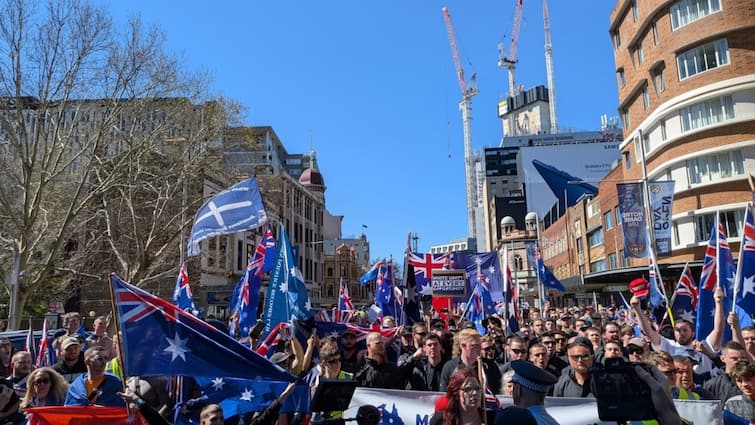Australia on Sunday witnessed anti-immigration rallies in nearly twenty cities, with thousands joining the protests, which particularly targeted the growing population of Indian migrants. The protests drew condemnation from the Australian government and sparked a nationwide debate, raising important questions about the motivations driving these rallies and the groups leading the charge.
The Australian government slammed the protestors for spreading hate and being connected to the neo-Nazi groups, saying that the “brand of far-right activism grounded in racism and ethnocentrism” has no place in the country.
Thousands of protestors gathered in Australia’s major cities, including Sydney, Melbourne, Brisbane, Canberra, Adelaide and Perth, to demonstrate against immigration.
In Sydney, between 5,000 and 8,000 people joined the “March for Australia” rally, many of them draped in Australian flags, according to the Australian Broadcasting Corporation.
A counter-rally was organised by the Refugee Action Coalition, a community activist group, which confronted anti-immigration demonstrators in Melbourne.
Growth Of Indian Population In Australia
Australia’s rich immigrant heritage is well-known, with a majority of its residents tracing ancestry back to England. Indian-born Australians now form the country’s second-largest migrant community, surpassed only by those from the United Kingdom.
As per The Sydney Morning Herald, there were only 156,000 people with Indian ancestry in 2001. This jumped to 2,42,000 in 2006 and further to 474,000 in 2011. By 2016, the figure had reached 6,19,000.
Data from the Australian Bureau of Statistics shows that as of June 2023, approximately 8.4 lakh Indian-born residents live in Australia, representing just 3.2 percent of the nation’s population in 2024. Despite being a relatively modest portion of the overall demographic, the community has become a focal point for individuals frustrated by rising living costs, housing pressure, and job market concerns.
Indian migration to Australia has seen steady growth since 2000, with the exception of a slowdown during the Covid pandemic years. Both government and opposition leaders have consistently praised the Indian community’s contributions to Australian society and the economy. Yet, extremist groups—white supremacists and neo-Nazis—have condemned the presence of people of colour and those belonging to non-Christian faiths, fuelling targeted resentment.
Rally Pamphlets Say ‘More Indians In 5 Years’
A rally pamphlet distributed by protest organisers March for Australia stated: “MORE INDIANS IN 5 YEARS, THAN GREEKS AND ITALIANS IN 100,” adding, “This isn’t a slight cultural change, it’s a replacement plain and simple.” This message underscores the intensity of anti-Indian sentiment present at the marches. Some speculate that people of Indian origin may lean toward backing the Liberal Party, stoking fears among protest groups that this could sway future election results.
The ‘March for Australia’ website stated: “Our streets have seen growing displays of anti-Australian hatred, foreign conflicts, and disintegrating trust, whilst mass migration has torn at the bonds that held our communities together.”
“This march is a stand for the people, culture, and nation that built Australia — and for our right to decide its future,” it added.
Prime Minister Anthony Albanese’s left-leaning government directly linked protest organisers to neo-Nazi groups. Supporters of the rallies, both online and offline, have demonstrated clear ideological leanings, including misogyny, climate change denial, support for US President Donald Trump, opposition to abortion rights, and conspiracy theories.
Among the crowd, members of the National Socialist Network (NSN)—a neo-Nazi group—were prominent. Leaders from Katter’s Australian Party, headed by federal MP Bob Katter, stood alongside NSN chief Thomas Sewell and addressed rally supporters. Sewell’s group was also implicated in attacks on gatherings of Aboriginal Australians, the continent’s indigenous population.
Social media came alive with images and footage of Sewell sporting neo-Nazi insignia and drawing enthusiastic cheers from the crowd. Online supporters vigorously defended the NSN and its leader. “It’s time to give us back our WHITE NATION!” proclaimed Jarrod Hampton, a self-identified white nationalist, as he posted rally videos on X.
Another X account, “Anti-Feminist Australia,” flooded the platform with posts lauding the NSN and controversially called for revoking women’s voting rights, asserting, “Allowing women to vote was the most stupid thing we ever did.”
Craig Kelly, a vocal opponent of unchecked immigration and former Senator, frequently posts arguments branding climate change as a “scam” and renewable energy as a “delusion.” Kelly strongly advocates for a return to fossil fuels as the answer to affordable electricity.



